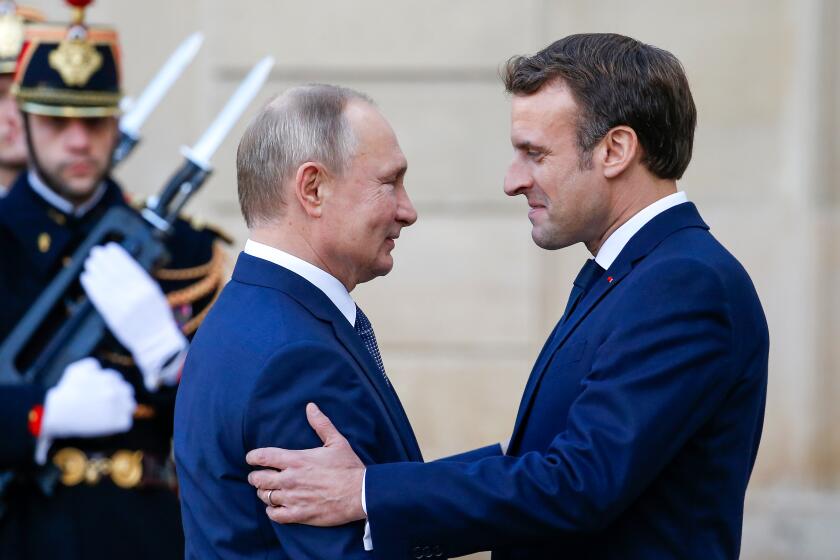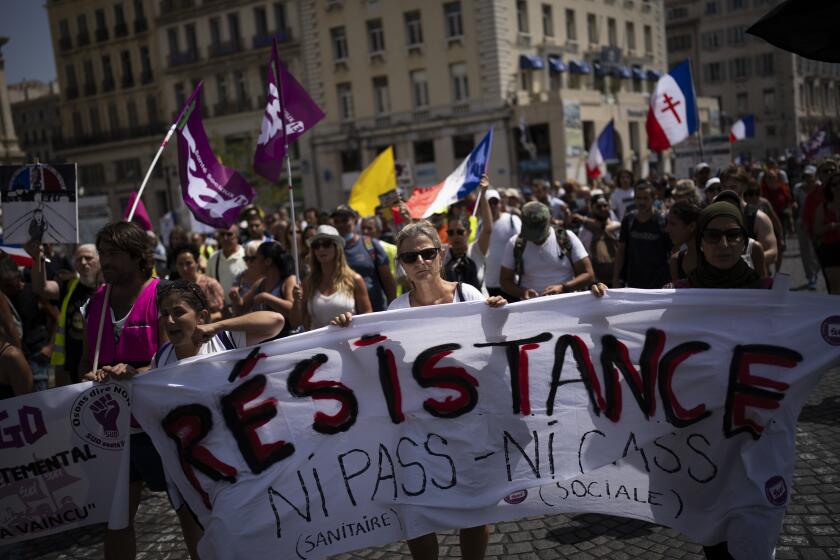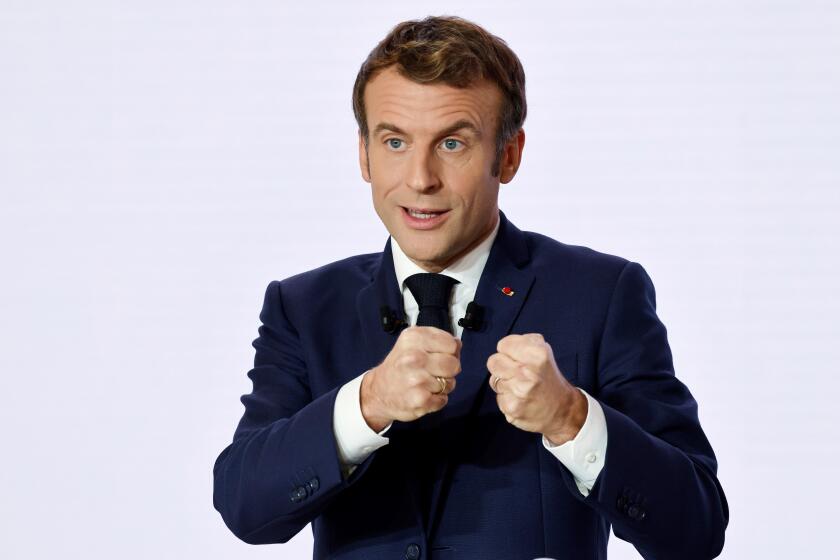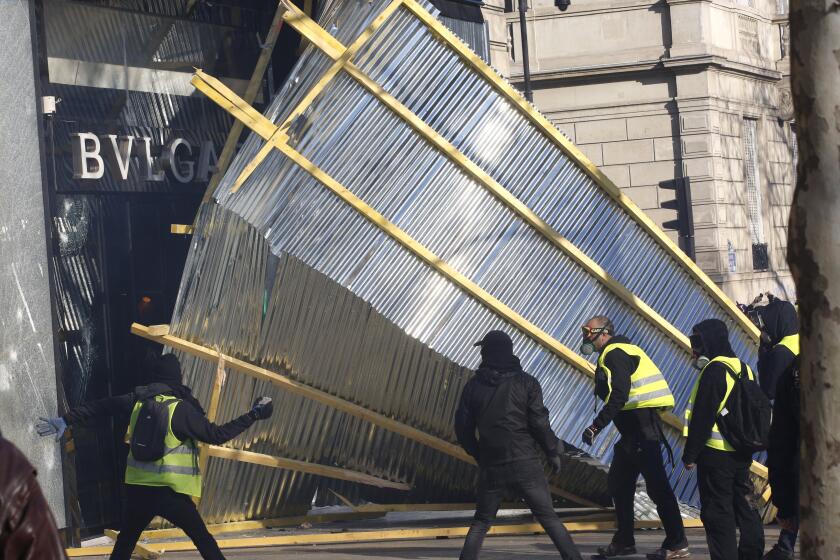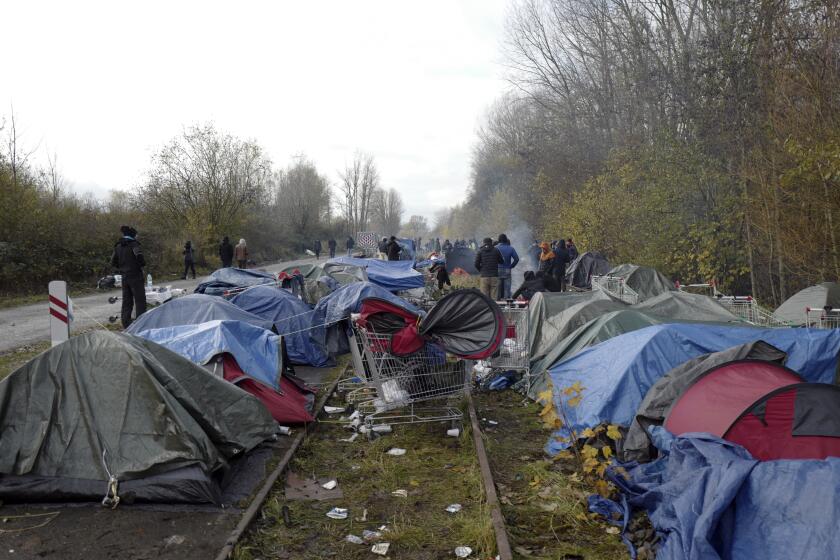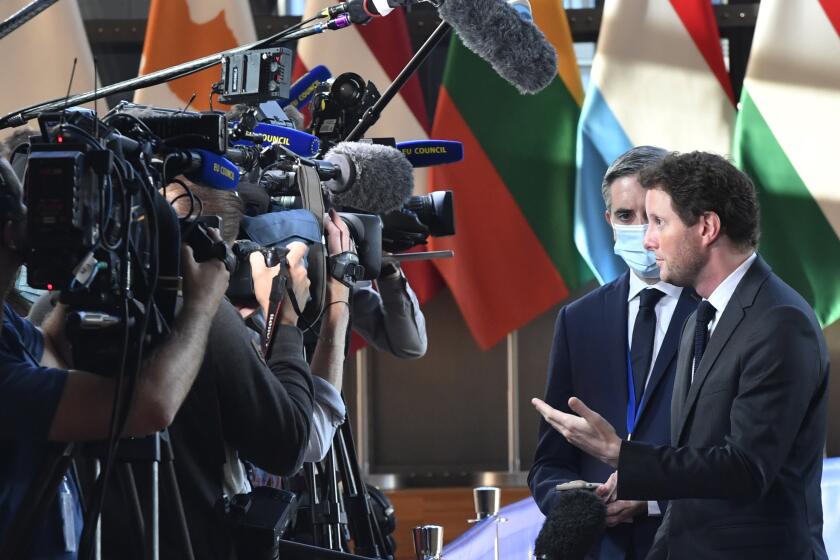In France, rise of the right puts Macron in trouble as presidential election looms
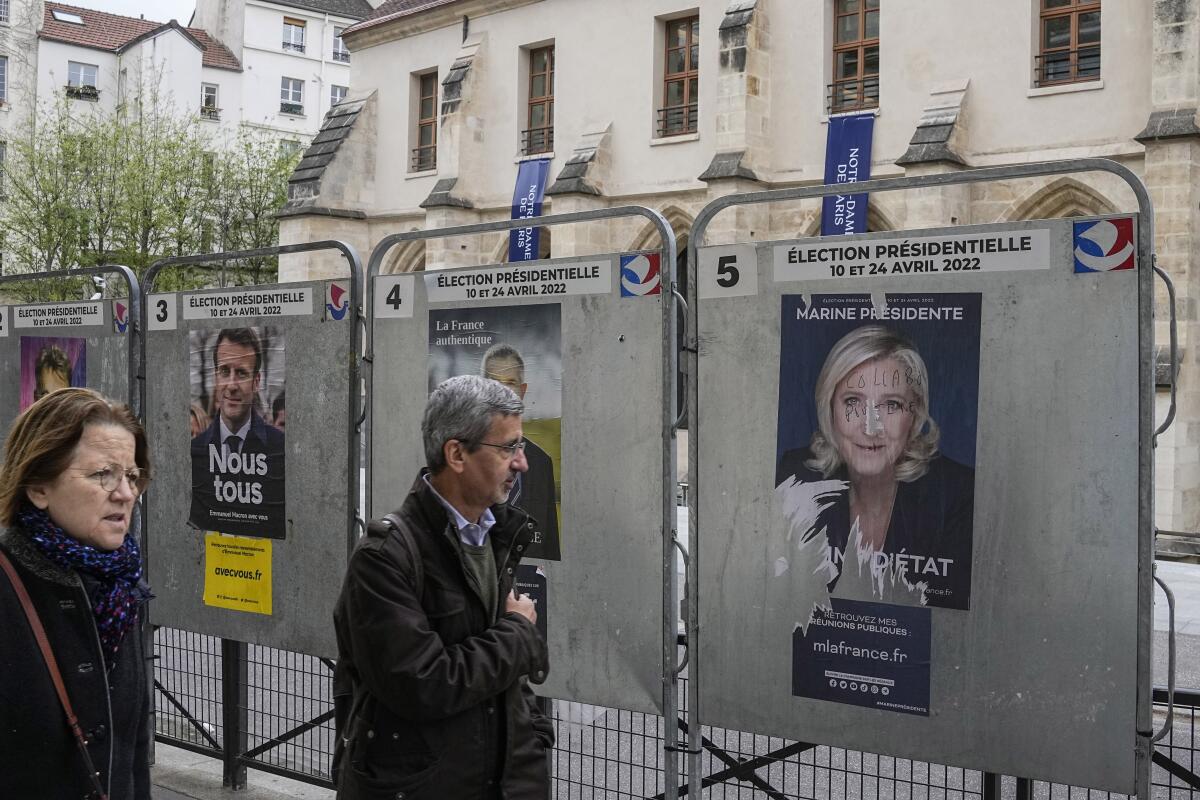
- Share via
Like many working-class voters, Bastien Verbrugghe dutifully cast his ballot for Socialist Party candidates in France’s elections when he was finally old enough to vote. But when he goes to the polls Sunday to help choose the country’s president, he plans to do something that might have once seemed unimaginable: check the box next to far-right politician Marine Le Pen’s name.
“The Socialist Party doesn’t exist anymore. They completely abandoned the working class and the working-class milieu,” the 36-year-old factory worker said, adding of Le Pen: “She addresses our concerns and has solutions.”
For Verbrugghe, who comes from the industrialized north of the country, the shift to what he calls the “social right,” meaning a conservative stance on immigration and security but a more liberal approach to the social safety net, began a decade ago — as it did for his father and pretty much everyone else in his circle.
They’re not alone: The entire electorate in France has shifted to the right over the last several years, scrambling political boundaries that had held fast for decades. According to a poll conducted on behalf of the Fondapol think tank in September, 38% of those surveyed described themselves as being somewhere on the right or the extreme right on the political spectrum, up from 33% in 2017.
That trend is evident when people are asked how they plan to vote in Sunday’s first round of the presidential election. Together, the anti-immigrant Le Pen and the former television pundit Eric Zemmour, who is even more extreme in his views, have more than 30% of the intended first-round vote, polls say — more than centrist President Emmanuel Macron, who is running for a second term.
“This election is playing out on the right,” said Antoine Bristielle, director of the Opinion Observatory at the Jean Jaures Foundation.
The French leader has been a principal interlocutor of Russian President Vladimir Putin. He’s applauded for this engagement, but are his efforts bearing fruit?
Supporters of both Le Pen and Zemmour bristle at the “far right” designation — particularly when it comes to Le Pen. Zemmour’s fans insist that he reflects the French mainstream, while Le Pen’s backers say that, with her nationalist, populist, pro-worker agenda, “she rises above” right and left, in the words of Verbrugghe.
“Far right is a violent movement,” he said. “She is not violent.”
Le Pen, who has run unsuccessfully for president twice before, has worked hard to shed her hard-line image, recalibrating her stance on many key issues. Where she once said that France should pull out of the European Union, she now says the bloc should be restructured; instead of hammering on immigration — which she still wants to restrict — she talks more about rising prices and the trouble many have making ends meet. Her language is less pugilistic.
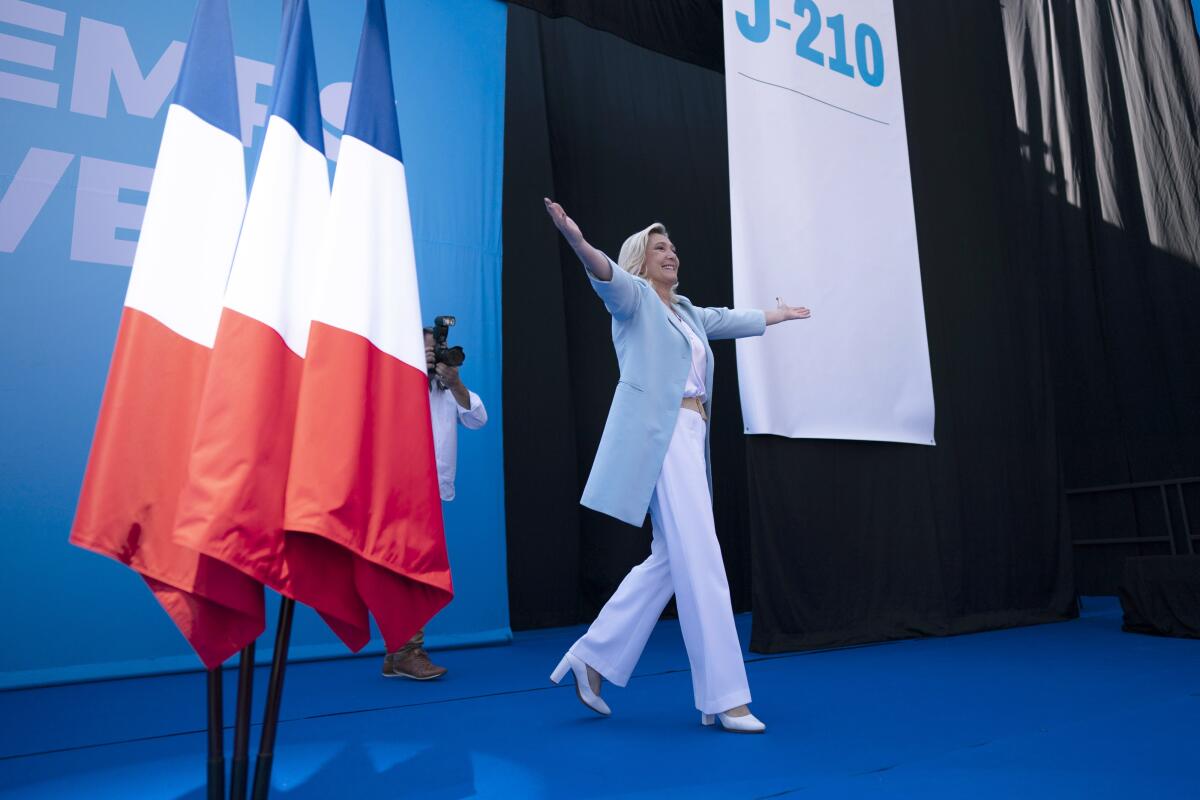
That has helped her make headway with traditionally leftist voters.
“The popular class that was on the left and anti-capitalist is now on the right and anti-immigration,” said political scientist Gerard Grunberg.
Although Macron, a political shape-shifter, is still projected to win a second term in an April 24 runoff vote, Le Pen has surged in the polls in recent days, tightening the race enough to worry the incumbent president’s campaign.
In France, an upsurge of physical and verbal attacks directed at public officials — often over COVID-19 policies — are ringing alarm bells.
The expected showdown between Macron and Le Pen would be a repeat of their 2017 matchup. Macron won that by a landslide, 66% to 34%, but a recent poll put their current head-to-head contest at 51.5% to 48.5%, still in Macron’s favor. Voter turnout could be key.
Polls show that many far-left voters plan to support Le Pen in the second round if their candidate, left-wing firebrand Jean-Luc Melenchon, doesn’t make it through.
The shift to the right is a reflection of demographic and socioeconomic changes in France, including increased immigration and the withering away of the industrial sector, analysts say. While the French economy is strong overall and unemployment is at its lowest point in a decade, factory jobs are increasingly scarce. Recent polls show that purchasing power is the issue most troubling French voters, with 57% saying it is their primary concern.
Le Pen heard that and responded.
French President Emmanuel Macron has provoked protests by using a vulgarity to describe his strategy for pressuring holdouts to get COVID-19 shots.
“I obviously consider that immigration and insecurity are serious problems which need urgent answers, but there’s not just that,” she said in a recent television appearance. “I worry about making ends meet as much as the end of [traditional] France.”
Immigration and public security remain in the top five of voter concerns, however, and continue to be powerful cudgels for politicians on the right.
“When your country is a declining power, which is the obvious case of France, there are more and more voters who need a scapegoat,” added Thomas Guenole, a political scientist and prominent left-wing intellectual. That scapegoat is immigration.
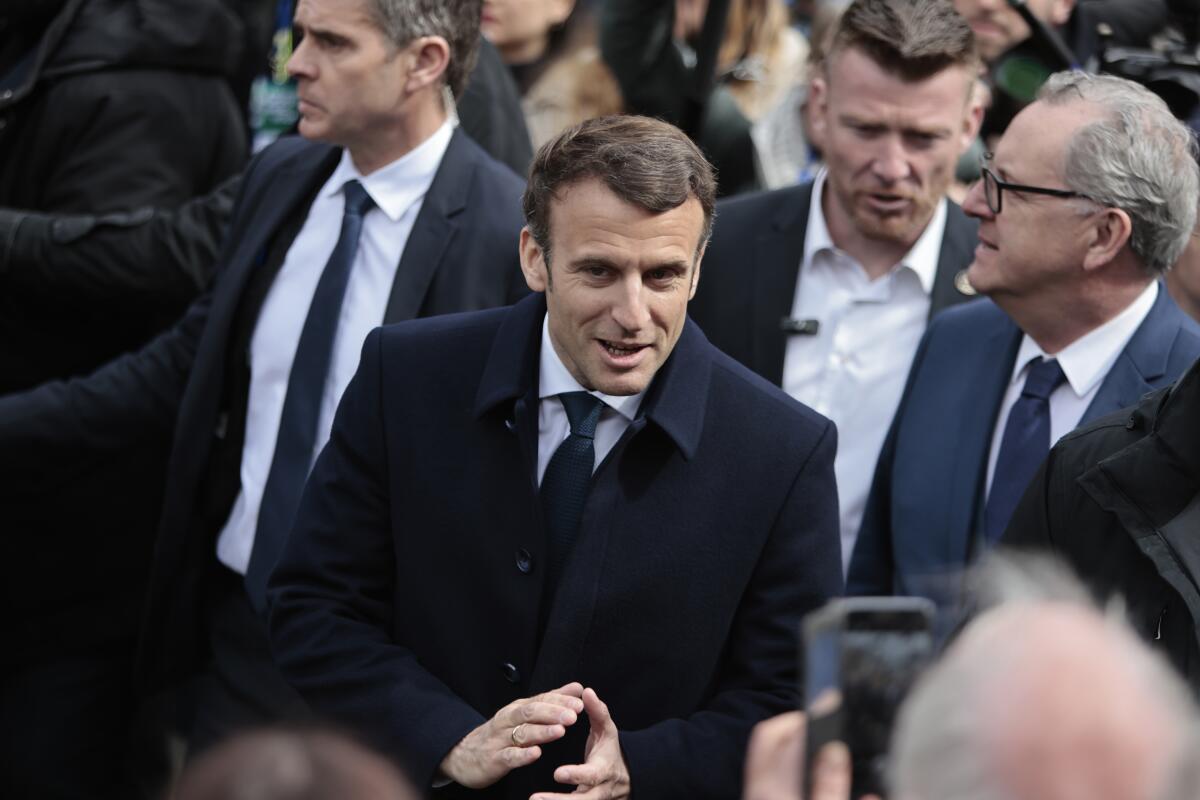
Rising fears of migration have pushed views that were previously considered extremist into mainstream discourse, specifically the phrase “great replacement” — the racist far-right theory that Europe’s white Christian population is at risk of going extinct because of Muslim immigration from continental Africa.
Zemmour, the fiery far-right commentator whose standing in the polls surged in the initial phase of his candidacy but has since slipped back, has pushed the phrase at rallies. But in a development that shocked many in France, the mainstream conservative candidate, Valerie Pecresse, also used the phrase in a speech earlier this year — though she insisted afterward that she was quoted out of context.
“During the ’80s, the idea that a right-wing presidential candidate would express a bluntly far-right point of view would be impossible. It would be political suicide,” Guenole said. “Now it is considered a political necessity.”
A dispute has broken out among French government officials over how to describe a wave of violent incidents this summer and how bad the situation is.
A poll conducted in October by Harris Interactive showed that 67% of people in France said they were “somewhat” or “strongly” worried about the idea of a so-called great replacement. Those concerns have proliferated even though only about 8% of the French population is Muslim; surveys across Europe consistently show that people overestimate Muslim representation in their countries.
“It’s supply-side politics. People care about what they’re told to care about,” said Emiliano Grossman, a political science professor at the Paris Institute of Political Studies. “If they’re told that the single most important issue is migration, they’ll listen to the people talking about migration, which is the right. What has moved to the right is political discourse.”
Macron has felt the pressure. While he continues to support progressive social causes, such as women’s rights, Macron has courted the right by introducing a bill intended to fight Islamist extremism that was widely criticized by rights groups and by appointing a hard-line interior minister.
Verbrugghe said that issues of security and reform of the judicial system were central to him and contributed to his support of Le Pen. She “knows how to be firm when necessary,” he said.
Start your day right
Sign up for Essential California for the L.A. Times biggest news, features and recommendations in your inbox six days a week.
You may occasionally receive promotional content from the Los Angeles Times.
France’s lurch to the right has been bolstered by the fact that parties on the left are in disarray. Only 10 years ago, Francois Hollande of the Socialist Party won the presidency, defeating conservative incumbent President Nicholas Sarkozy. Now, the mainstream left’s candidate, Paris Mayor Anne Hidalgo, is polling at 2% in the first-round vote.
Pecresse, the candidate of Sarkozy’s Republicans party, is at 10%. Her and Hidalgo’s poor numbers are due partly to the collapse of the traditional right and left, respectively, as the French polity realigns itself.
“France is currently undergoing a dynamic recomposition of its three major political forces” — the left, the center and the right, said political scientist Grunberg.
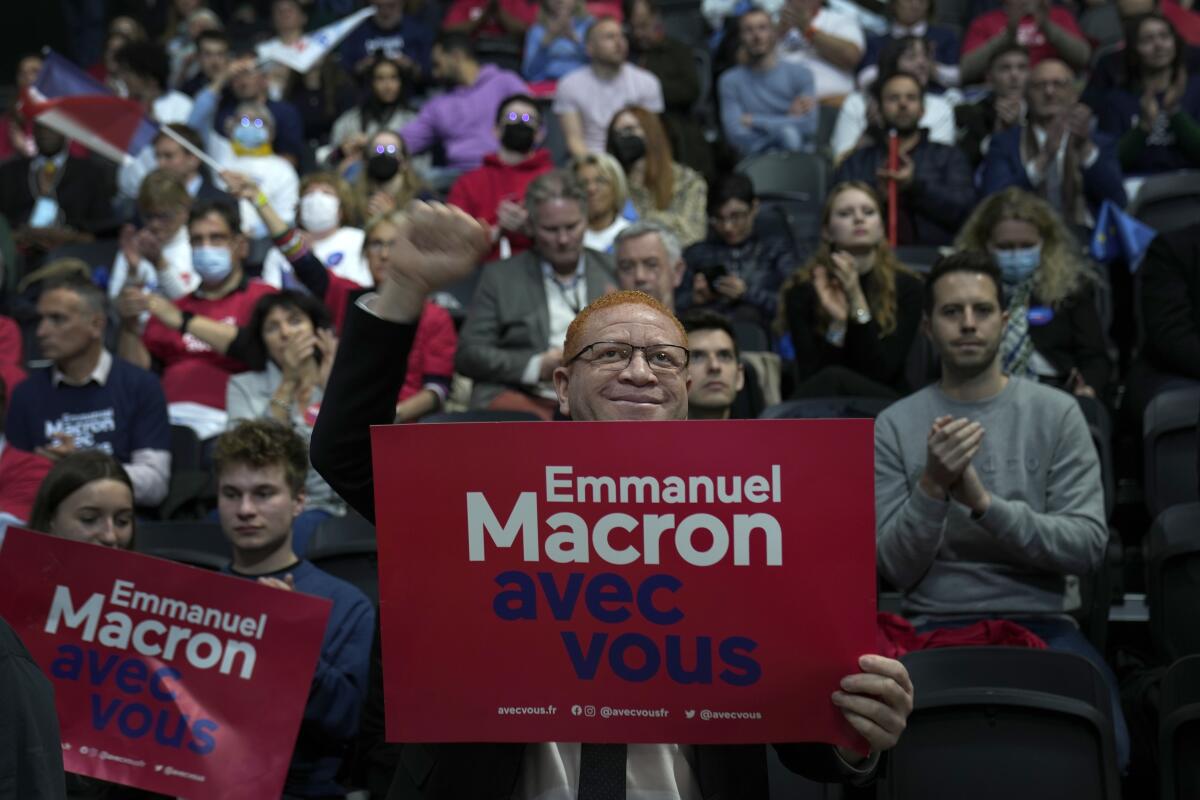
That is, in large part, because of Macron, who leaned left on social issues and right on economic issues when he broke onto the political scene in 2016. His Republic on the Move party picked off more centrist voters from both the traditional left and right parties.
“Macron represents a break more than anyone else we’ve ever had,” Grossman said.
Yann Wehrlin, vice president of the Ile de France region around Paris, is a longtime ecologist who shows how the political lines are blurring.
At the makeshift camps in France near Calais and Dunkirk, migrants are digging in, waiting for their chance to make a dash across the English Channel.
Until 2007, he was a member of the Green party. Today he is an independent, but he was elected on Pecresse’s conservative slate.
“I considered myself an ecologist and for the environment, and I want to work with the people who do the most for that,” Wehrlin, 51, said. “On the left they didn’t have good results, and on the right they had better results. It was a choice based on ecology.”
Pierre Luton, a 66-year-old sound engineer, agrees that “the parties are mixed up.”
Luton voted far left when he was young and for the more mainstream Socialists when he grew older. In 2017, though, he cast his ballot for Macron.
France’s EU partners have agreed to put the country’s security spat with the U.S., Britain and Australia at the top of the bloc’s political agenda.
“The old parties were running out of breath,” he said. “I thought Macron was a breath of fresh air.”
This time around, he is less enthusiastic about the sitting president. Then again, Luton finds both leftist candidates, Hidalgo and Melenchon, unconvincing, too, so he’ll probably check the box next to Macron’s name again.
“We don’t have much choice,” he said.
El-Faizy is a special correspondent.
More to Read
Sign up for Essential California
The most important California stories and recommendations in your inbox every morning.
You may occasionally receive promotional content from the Los Angeles Times.
